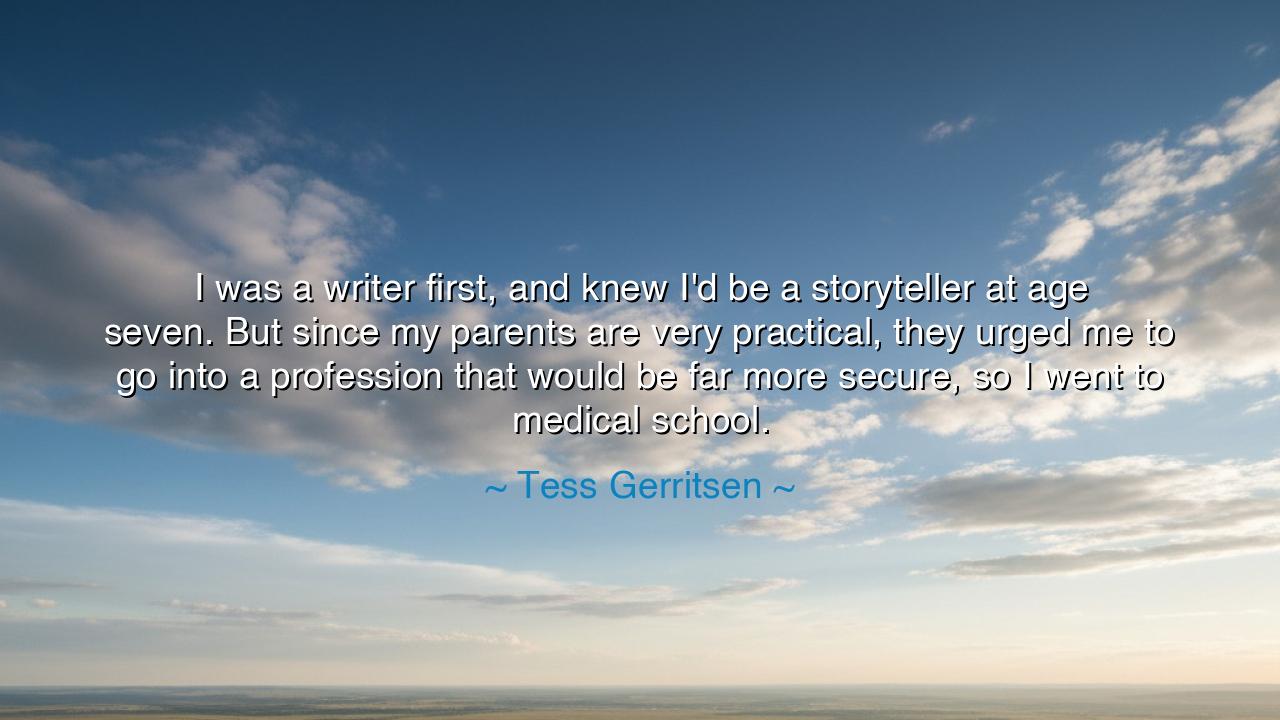
I was a writer first, and knew I'd be a storyteller at age seven.
I was a writer first, and knew I'd be a storyteller at age seven. But since my parents are very practical, they urged me to go into a profession that would be far more secure, so I went to medical school.






The words of Tess Gerritsen—“I was a writer first, and knew I'd be a storyteller at age seven. But since my parents are very practical, they urged me to go into a profession that would be far more secure, so I went to medical school”—carry within them the timeless struggle between dream and duty, between the heart’s longing and the world’s caution. Her confession is not merely a personal reflection but a mirror of the human journey itself, where passion often meets the barrier of practicality, and the artist within must learn to survive in a world that does not always understand art. In these few words lies the story of countless souls who have heard the call of their destiny but have been taught to answer instead the call of safety.
From the time of the ancients, this conflict has existed. The young Hippocrates, who would one day become the father of medicine, was once drawn to the poetry of his era, yet his family urged him toward the healing arts—practical, noble, and respected. And though he became a physician, his writings still carried the rhythm and soul of a poet. Like Gerritsen, he too lived between two worlds: the world of science, where the mind rules, and the world of story, where the spirit reigns. The great secret is that the two are not enemies but reflections of one truth—the desire to understand life in all its forms.
When Tess Gerritsen speaks of knowing she would be a storyteller at age seven, she reveals a profound truth: destiny often whispers early. It is a quiet knowing that settles deep in the bones, long before the intellect can name it. Children, unburdened by fear or expectation, hear this voice clearly. But as they grow, the world’s logic begins to cloud that inner calling. Parents, out of love and worry, often seek to protect their children from the uncertainty of creative life. They trade risk for security, dreaming for stability. And yet, no matter how far one travels from one’s calling, it follows like a shadow, patient and persistent.
The path Gerritsen chose—medicine—is itself a story of service and understanding. In healing others, she came to know the human condition more intimately than most writers could. Every illness, every patient, every silent waiting room became a study in suffering and hope. The precision of the scalpel became the precision of her prose. Her years in the clinic did not silence the storyteller within her—they sharpened her. The doctor learned the body; the writer learned the soul. And when the two finally met, she gave birth to characters who embodied both—the logical and the emotional, the healer and the human.
Consider the story of Anton Chekhov, the Russian doctor who became one of the world’s greatest playwrights. He too studied medicine at the urging of practicality, yet he wrote in the late hours after tending to his patients. When asked how he reconciled the two paths, he said, “Medicine is my lawful wife, and literature is my mistress.” But over time, the mistress became the truer love. Like Gerritsen, Chekhov discovered that one calling can feed another—that knowledge of flesh and suffering can enrich the art of storytelling. Both sought truth, though one through science and the other through art.
In Gerritsen’s words, there is no bitterness—only wisdom. She does not condemn her parents’ practicality; she honors it. For perhaps without it, she would not have gained the depth that later gave her stories life. To have lived in both worlds—the rational and the imaginative—is to see the full spectrum of human experience. The lesson she offers is not that one must reject the safe path, but that one must never forget the first calling, the voice of the seven-year-old who already knew. Even if life delays your dream, it cannot destroy it, so long as you keep the flame alive in silence.
The lesson of this quote, then, is this: do not despise the detours that life imposes upon your dream. Sometimes the long road gives you the wisdom your art will one day require. If your parents or society lead you toward practicality, take from that journey what you can—but when the time comes, return to your true voice. Passion, though buried, is not lost. It waits, patient as the dawn, for the courage to be followed once more.
So, my child, remember this: you may walk many roads before reaching the one that belongs to you. Do not fear practicality, but do not mistake it for purpose. Like Tess Gerritsen, carry both your reason and your imagination as twin lanterns through life. Let one guide your steps, and the other guide your soul. For only when heart and mind work together—only when the doctor listens to the dreamer—does the story of one’s life become whole, and the writer within at last come home.






AAdministratorAdministrator
Welcome, honored guests. Please leave a comment, we will respond soon